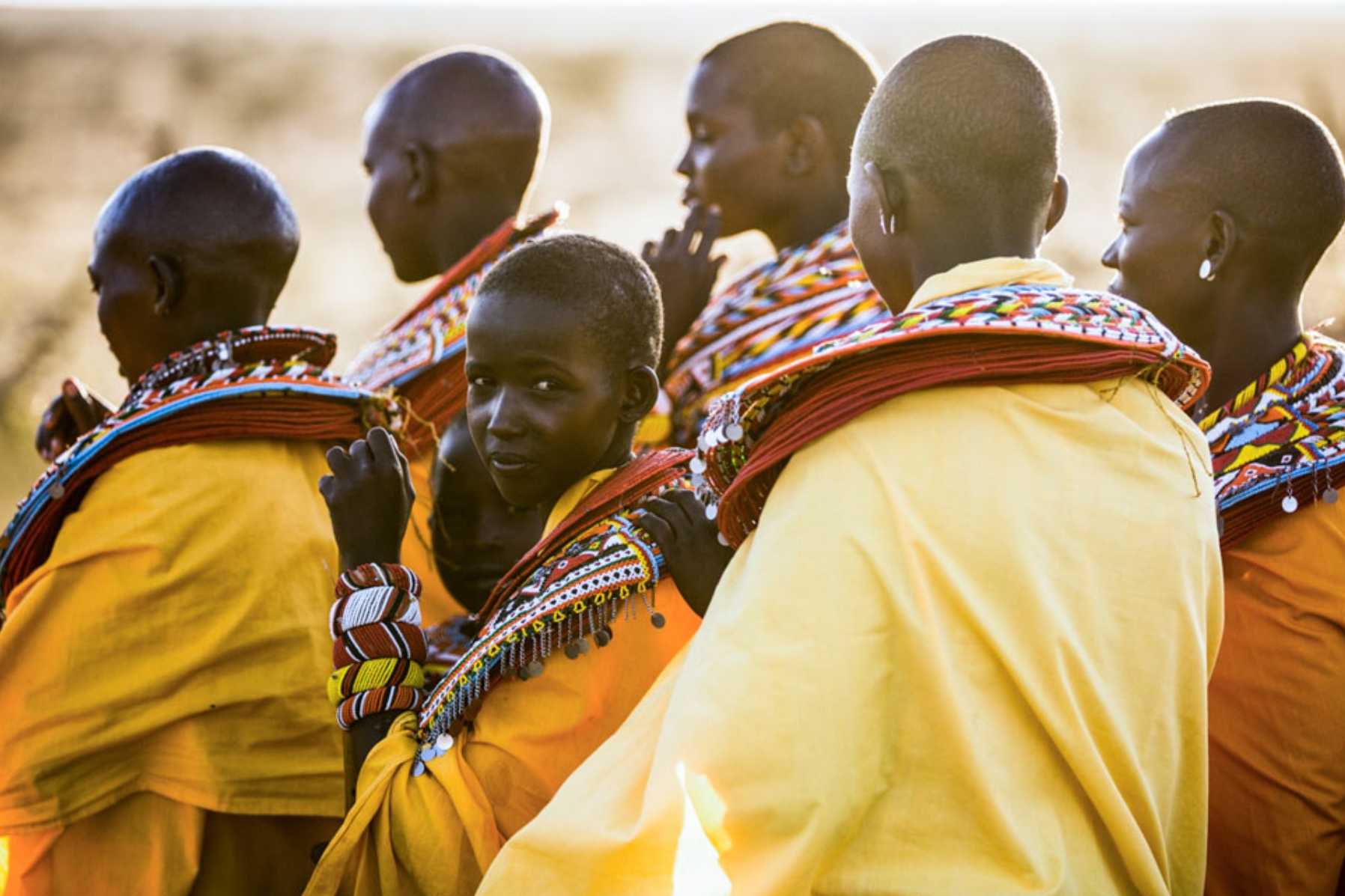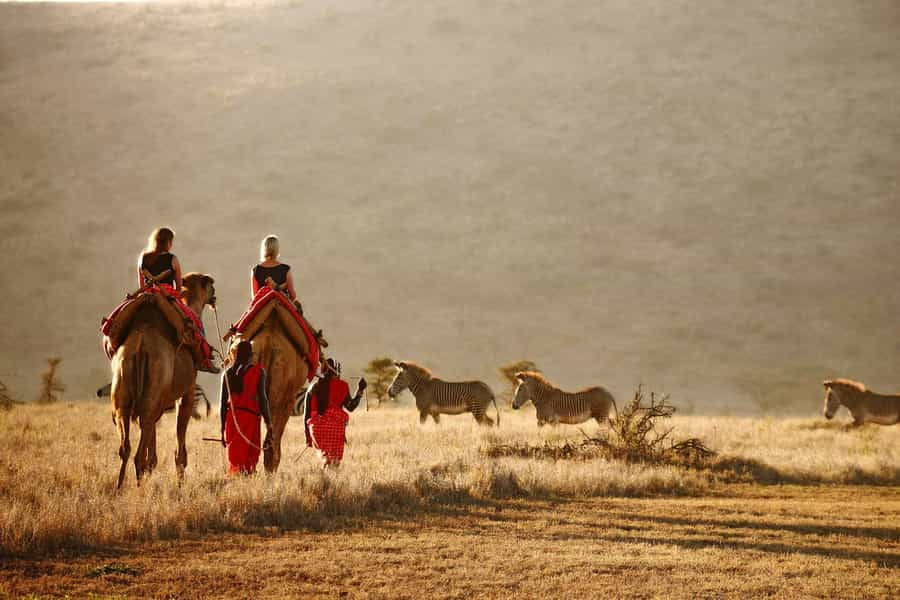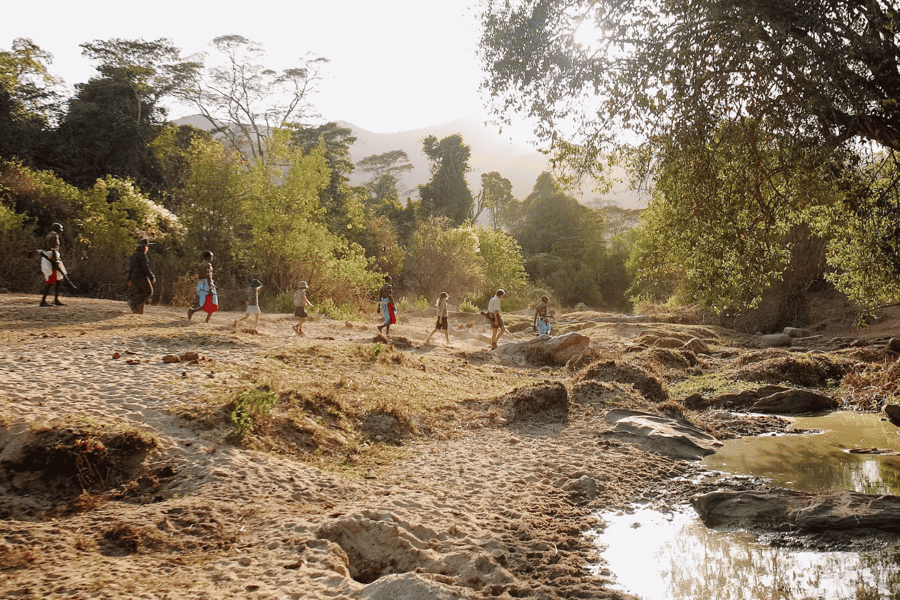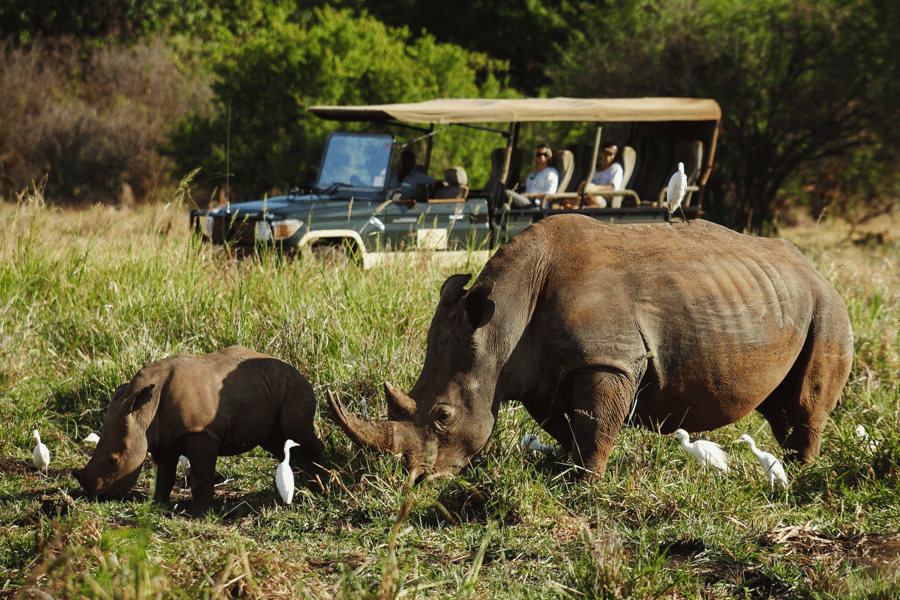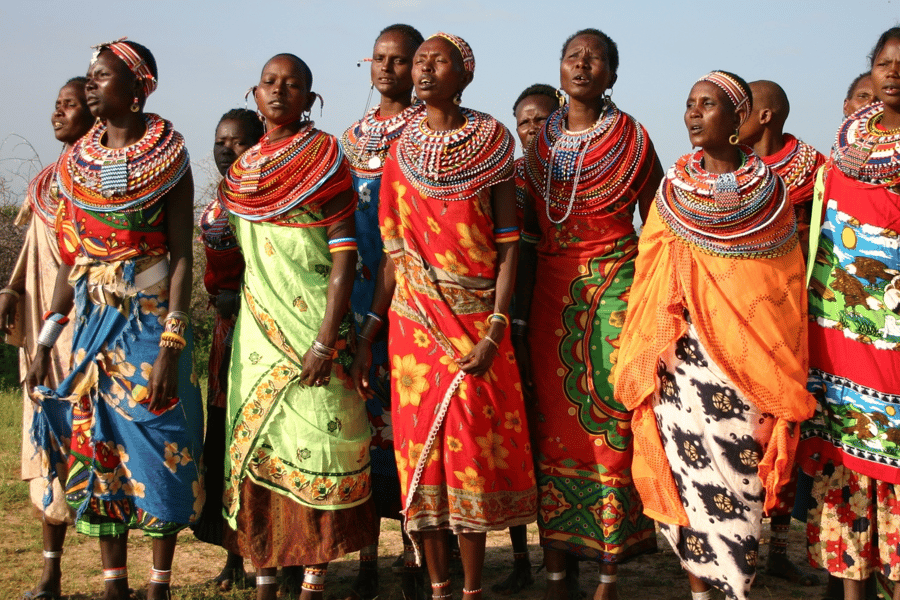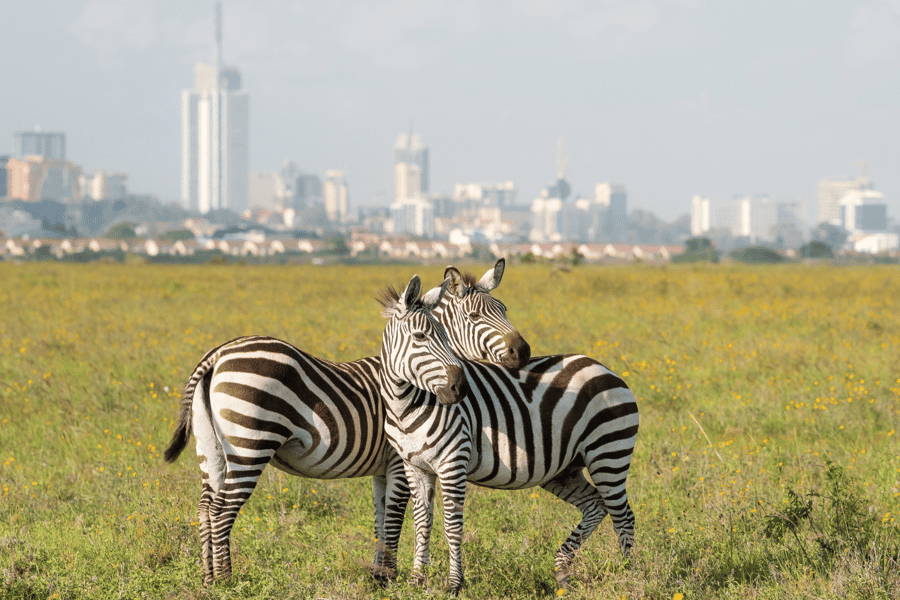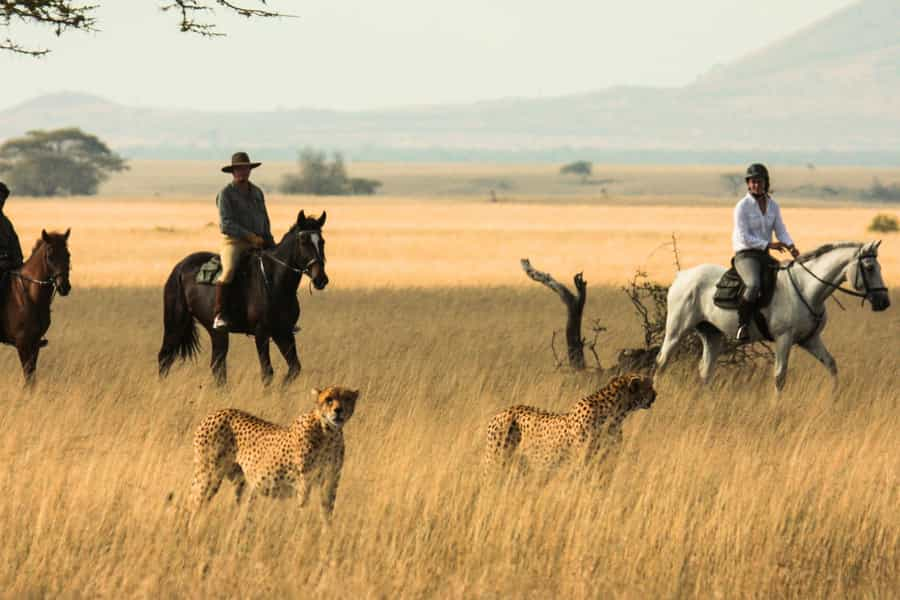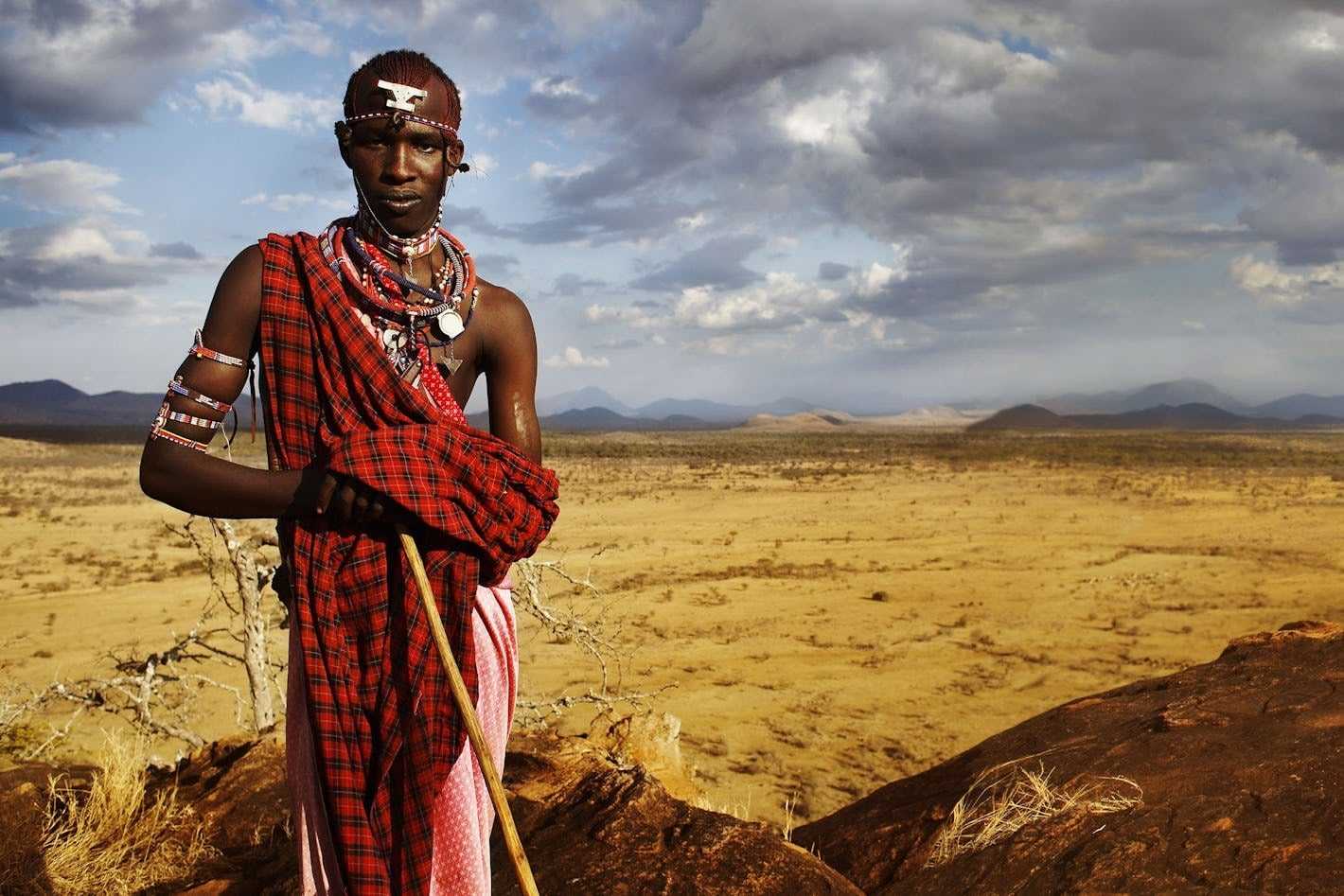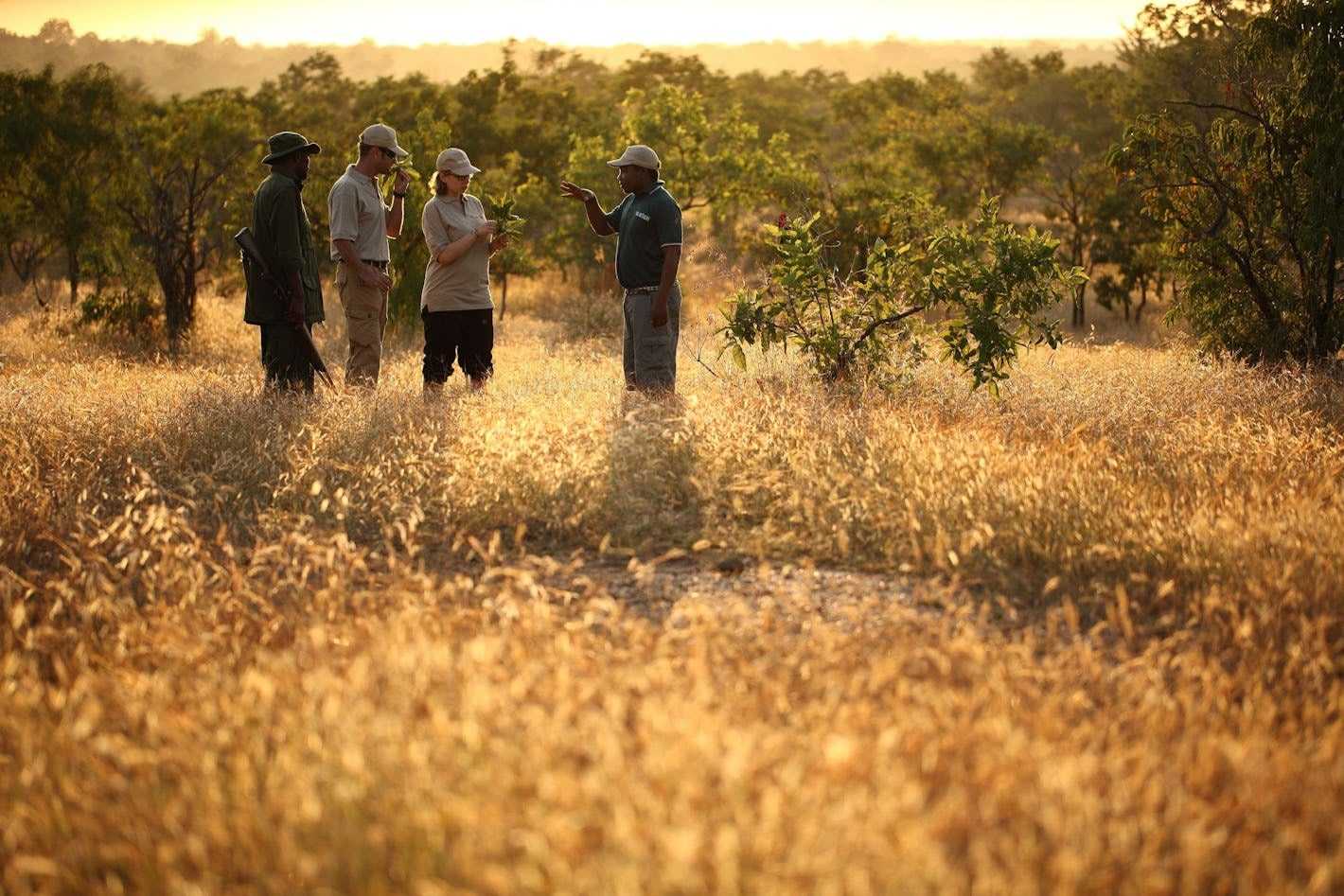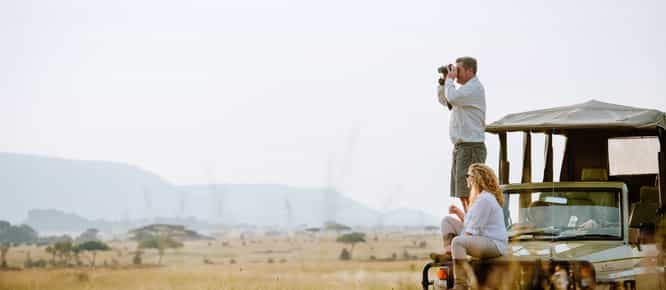Tourism in Kenya is defined by a ‘roll-up-your-sleeves’ attitude to conservation that supports community-owned conservancies, where locals can live off the land (just as they have for centuries) and still earn tourism dollars. This hands-on approach ensures that tourism-driven conservation efforts create a sustainable future for the planet, wildlife and people. It’s a win-win! So, if you’re looking for a dose of conservation and culture in Kenya, pack your bags and get ready for an adventurous safari with a purpose.
What is ecotourism, anyway?
We love how in recent years we’ve seen travellers become much more deliberate about planning eco-conscious holidays that make a positive difference. It’s no longer simply about choosing destinations wisely (to avoid overtourism), using more eco-friendly modes of getting there, or staying at sustainable properties. It’s become so much more than that. Ecotourism is about treading lightly, paying it forward, and leaving things better than we found them. Because it’s a topic that’s really close to our hearts at Timbuktu, we’ve written a guide about how to be an eco-conscious-traveller.
Ecotourism in Kenya encourages travellers to immerse themselves in the local culture by supporting community-run projects, and packing for a purpose, rather than handing out gifts, despite their good intentions. It allows travellers to better understand the local people, while learning about their traditions, history, heritage, and ways of life. It can be as simple as thinking about how your money can benefit the local community – by hiring local guides, eating at regional restaurants, buying locally-crafted souvenirs or visiting a community-run cultural village. Being mindful in these ways also allows travellers to truly connect with the people they meet in meaningful ways.
This responsible way of thinking about how we travel focuses on low-impact activities – like exploring the savannah on foot during a guided walking safari, taking to a mountain bike in search of wildlife or doing a horseback safari in Laikipia. Also, camel safari, anyone – we’re not even kidding! And along Kenya’s coastline, there’s the chance to jump into the warm Indian Ocean with a snorkel, go scuba diving among colourful corals in a marine protected reserve, or embark on a sunset dhow cruise with a drink in one hand and snacks in the other.
Ecotourism in Kenya is equally about getting your hands dirty by participating in various conservation initiatives, such as planting trees to restore habitats, monitoring wildlife, volunteering at rehabilitation centres, working on citizen science projects, and partaking in educational programmes that have a positive impact on the ground.
Tourism in Kenya is geared towards responsible travel
By its very nature (if you’ll excuse the pun), travel and tourism in Kenya is geared towards responsible travel. The East African country is best known for its nature reserves, national parks, conservation areas, private conservancies, community-owned wildlife sanctuaries, marine protected areas, and UNESCO biosphere reserves. One of the very reasons why we love it so much! Kenya’s unspoiled landscapes, abundant biodiversity, and show-stopping wildlife encounters is precisely what makes it a top ecotourism destination – not just in Africa, but the world.
Ecotourism in Kenya: Conservation Initiatives
Take it from us, some of the most successful conservation projects in Africa are found in Kenya. Not only do these initiatives safeguard the country’s diverse ecosystems – from golden savannahs and luscious forests to mountains, wetlands and its gorgeous coastline – but they also look after endangered animals, keep nature in balance, and prevent poaching. These are the ones you won’t want to miss.
Sheldrick Wildlife Trust Elephant Orphanage
The world-famous Sheldrick Wildlife Trust Elephant Orphanage has been flying the ‘ecotourism in Kenya’ flag since 1977. It rescues and rehabilitates orphaned elephants (as well as black and white rhinos) who have lost their mothers through poaching, human-wildlife conflict or from natural causes. Their dedicated keepers provide round-the-clock care and a whole lot of TLC, so that these youngsters can eventually make their way back to the wild. They even have a nursery in Nairobi National Park, where you can meet the baby elephants and see the heartwarming bond with their keepers.
Ol Pejeta Conservancy and Sweetwaters Chimpanzee Sanctuary
The largest black rhino population in East Africa is found within the 90,000-acre Ol Pejeta Conservancy. And, get this, it’s also home to the last two Northern White rhinos in the world. You’ll also have the chance to see African wild dog, Grevy’s zebra, kongoni, bongo, giant forest hogs and oryx during a visit. Choose between doing a day (or night) game drive, guided bush and bird walk, lion tracking, or joining the rhino monitoring team for a hands-on experience.
Ol Pejeta is also where you’ll find the Sweetwaters Chimpanzee Sanctuary – the only one of its kind in the country. It’s a forever home to chimpanzees who have been rescued from the illegal pet trade. Here, they get to live in large social groups and just be chimps. The best time to visit is during feeding times, but they can always be spotted getting up to all sorts of fun-filled activities in their very spacious enclosures.
Meru Rhino Sanctuary
The luscious vegetation and swampy riverbeds of Meru Rhino Sanctuary (a 83km2 fenced off area of Meru National Park) is a safe haven for 45 black and 100 white rhinos. To prevent poaching, they’re under 24/7 protection, thanks to the watchful eyes of armed rangers and some seriously high-tech security measures. On a guided tour, you’re guaranteed multiple clear sightings of these critically endangered animals. It’s a must, especially if you want to see rhinos in real life and you’re looking for an experience that supports ecotourism in Kenya.
Ecotourism in Kenya: Community-led Tourism
Kenya really gets that conservation works best when it’s a team effort. Supporting community-run tourism activities so that the local people benefit directly from protecting wildlife ensures the success of conservation projects and cultivates a sustainable approach to tourism in Kenya.
The Northern Rangelands Trust
The Northern Rangelands Trust is another game-changer in the responsible tourism space. This community-led non-profit protects 33 conservancies across a massive 44,000km2 in northern and coastal Kenya. Since 2004, they’ve made incredible progress that’s seen a big reduction in poaching, wildlife trafficking, as well as tribal conflicts. Their community-driven approach has even helped shape government regulations for running community conservancies in Kenya.
The Predator Compensation Fund
In today’s day and age, the coexistence of humans and predators in wildlife areas is critical to conservation efforts, especially in a country like Kenya where safaris are its biggest selling point. Before 2003, there was a real problem when predators often killed the Maasai’s valuable livestock. Understandably, they’d want to protect their livelihoods, which sometimes resulted in the killing of predators, leading to dwindling predator populations. The Predator Compensation Fund offers remuneration to these pastoralists when they lose livestock, which reduces human-wildlife conflicts. The result? It’s created a massive one million acre corridor where lions and other predators can roam much more freely.
Meet the Maasai
Traveling is not simply about the places we visit and the things we do. It’s also about having authentic interactions with the local people. Travellers can meet ‘the true keepers of Kenya’ during a visit to a local Maasai homestead in Amboseli or Tsavo national parks. Here, they’ll meet the warriors – in their red shukas, intricate beadwork, leather sandals – as well as community members. They’ll gain insights into the Maasai’s way of life in modern-day Kenya, and listen to myths, legends and traditional songs. Travellers will also have the chance to see the Adumu ‘jumping dance’ – a rite of passage for young warriors entering manhood and to find a partner. These kinds of village experiences help to supplement the Maasai’s pastoral livelihood in an ever-changing world, while allowing travellers to support ecotourism in Kenya as a way of paying it forward.
Meet the Samburu
Similarly, in the northern reaches of the country, travellers can meet the Samburu tribe who are characterised by the ornate beaded necklaces worn by the women and the braided, ochre-dyed hair of young warriors. It’s an opportunity to put the camera away and gain insights into their deep connection to the land and culture over a shared traditional meal with the community. At its heart, ecotourism in Kenya is all about leaving a positive impact not just on the planet and wildlife, but also on its people.
Ecotourism in Kenya: What to do in and around Nairobi
You don’t even have to leave the capital city to partake in ecotourism in Kenya. Whether you’re going souvenir shopping at a local market for colourful beaded sandals, a kikoi, or a Maasai blanket – buying handmade rather than mass-produced goods makes all the difference. It supports skills development and helps locals earn a sustainable living from their talents. We believe that supporting entrepreneurs, family-run projects and community-owned initiatives goes a long way to maintain sustainable livelihoods and bolster any local economy.
That’s precisely why we love the entrepreneurial grandmothers you’ll meet on a One Horizon cultural tour. They’re overcoming generational cycles of poverty through small-scale pig farming. You’ll have the chance to roll up your sleeves and help out on the farm, cook a traditional meal over a fire, listen to their stories, and share in their laughter. It’s these kinds of real experiences that forge genuine connections with the people and places we visit.
Doing a coffee tour or buying beans to take home from the family-run Karunguru Coffee Estate is a fantastic way to support local farmers directly. All while learning about coffee cultivation traditions that have been passed down through generations, with an aromatic cuppa in hand. The same goes for a walking tour of the luscious Kiambethu Tea Farm that’s been in the same family for five generations. At Timbuktu Travel, we deliberately connect you with experiences that celebrate and support ecotourism in Kenya, ensuring your journey is as enriching for the people as it is for you.
Ecotourism in Kenya: Sustainable Accommodation
We’re also seeing that travellers are becoming more conscious about where they stay. More and more are choosing sustainable accommodations that minimise their environmental impact. At the end of the day, it’s all about keeping those destinations intact for years to come.
Tourism in Kenya is geared towards eco-friendly safari lodges and tented camps that use locally-sourced materials, are decorated with hand-made artefacts, and are big on renewable energy, recycling, and reducing waste. There’s also been more focus on properties that offer fair employment, support skills development, and partner with regional businesses and local communities to offer ecotourism activities. Many of these properties are built in conservancies on community-owned land that is leased from local tribes. They also often charge conservation fees that go back into the conservancy or a non-profit foundation for wildlife protection and community development. If that’s something that resonates with you, look for properties with ‘Gold Level status’ from the Kenya Ecotourism Society. Or read about the top 10 lodges that promote ecotourism in Kenya.
So, if you’re dreaming of an African safari with incredible wildlife sightings that also supports community tourism and conservation, Kenya is calling your name.
